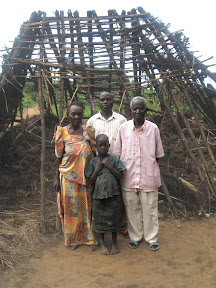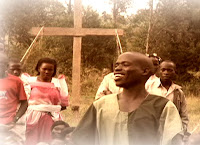[youtube=http://www.youtube.com/watch?v=00D3bz2WDgE&searchbar=0&iv_load_policy=3&ap=%2526fmt%3D18]
This chapter of The Revealed Truth opens up with some classic bargaining by Judas. Ugandans love to make a deal. Judas may seem overacting here, but I would get just as expressive trying to buy passion fruit from the neighborhood bodega or setting the price for a taxi. When you’re in the mood, you can get some really great deals. If you’re tired and just want to make the sale, the vendors will rip you to shreds. Most commodities don’t come with a set price. The vendor will begin by sizing up the consumer. As I was a Muzungu (white man) the seller immediately inferred that I was also an Omugagga (rich man). Prices start on the astronomically high side. I’d counter with something ridiculously low and hopefully we’d meet somewhere in the middle. If all else fails, turning your back in the middle of the transaction can get you a dramatic discount. Bargaining is true capitalism because each transaction reevaluates the product’s supply and demand. Switching to English during a deal will automatically chalk up a muzungu tax.
As Jesus figures out how He’s going to feed the masses with two loaves of bread there is a disturbance in the background. One of the shepherds chases the neighborhood kids around and swats at them with a stick. The shepherd also doubled as the play’s enforcer of crowd control. If a child got too close to Jesus or the disciples he would beat them. It provides some real life foreshadowing of Jesus’s Let the Little Children Come to Me sermon, but nobody watching the performance seemed concerned about the violence.
 While Uganda’s youth empowerment agenda looks very progressive on the books, it’s not practiced. Corporal punishment is illegal, but I saw students at the school caned many times. When I ran into a teacher flogging a kid I’d go into shock and just stand there. The teacher usually would look up, see me, get embarrassed,and take a break until I left. Most headmasters will publicly acknowledge that child abuse is wrong and bad for donor relations. However, when faced with the choice to stop they don’t know an alternative. The issue runs deeper than discipline. In one study 98% of the Ugandan children interviewed experienced physical or emotional violence at home. In the hierarchy of society children are one peg above animals because they have better motor skills. It’s a utilitarian mindset. Children are valued because they can work. There are no microwaves or washing machines, but there are lots of kids. Many students attending my school were from child-headed households and had no parents to advocate on their behalf. The education was free, but many days out of the week their classes took place out in the fields where they were “learning” to dig trenches or clear brush.
While Uganda’s youth empowerment agenda looks very progressive on the books, it’s not practiced. Corporal punishment is illegal, but I saw students at the school caned many times. When I ran into a teacher flogging a kid I’d go into shock and just stand there. The teacher usually would look up, see me, get embarrassed,and take a break until I left. Most headmasters will publicly acknowledge that child abuse is wrong and bad for donor relations. However, when faced with the choice to stop they don’t know an alternative. The issue runs deeper than discipline. In one study 98% of the Ugandan children interviewed experienced physical or emotional violence at home. In the hierarchy of society children are one peg above animals because they have better motor skills. It’s a utilitarian mindset. Children are valued because they can work. There are no microwaves or washing machines, but there are lots of kids. Many students attending my school were from child-headed households and had no parents to advocate on their behalf. The education was free, but many days out of the week their classes took place out in the fields where they were “learning” to dig trenches or clear brush.
America is on the other end of the spectrum. We put our children on a pedestal. We spoil kids and make them whine from overindulgence. The youth culture fuels our economy with the music, movies, and media that makes our country famous. Yet, all expenses are paid with a parent’s credit card. Most American children under 12 years aren’t their family’s breadwinners. We have child labor laws against that. In Uganda, if a child doesn’t bring home the bacon, then they don’t eat.

 Perseverance of families in this environment is amazing. Despite the prevalence of abuse, strong family bonds are the key to survival. Take Julius, the actor who plays the prodigal son. He was in his mid twenties and living with his parents. He wasn’t a deadbeat sleeping on the couch, but working side by side with his parents and sister on the farm. During the month of the play’s performance his family’s home collapsed. Subsistence farmers don’t have home insurance but Julius helped his aging father salvage what he could and they built the structure over again. There is a loyalty to family, clan, and tribe in Uganda that is not found in the West. In such an impoverished country there are very few street gangs. The communal nature of the village doesn’t allow them to form. Even if a child’s parents weren’t in the picture, their aunts, uncles, and grand parents were around to provide a support system.
Perseverance of families in this environment is amazing. Despite the prevalence of abuse, strong family bonds are the key to survival. Take Julius, the actor who plays the prodigal son. He was in his mid twenties and living with his parents. He wasn’t a deadbeat sleeping on the couch, but working side by side with his parents and sister on the farm. During the month of the play’s performance his family’s home collapsed. Subsistence farmers don’t have home insurance but Julius helped his aging father salvage what he could and they built the structure over again. There is a loyalty to family, clan, and tribe in Uganda that is not found in the West. In such an impoverished country there are very few street gangs. The communal nature of the village doesn’t allow them to form. Even if a child’s parents weren’t in the picture, their aunts, uncles, and grand parents were around to provide a support system.
The Revealed Truth Blog Series
This post is the fifth of a nine part series that takes an in-depth look at the The Revealed Truth and how rural Ugandan culture influenced the making of the film. The movie is about an hour long but I’ve broken it down into 5 to 10 minute blog-size episodes. The next post will feature the Last Supper.
The previous post was The Revealed Truth Part 3: Good Samaritans.



